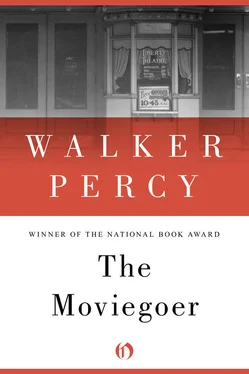Walker Percy - The Moviegoer
Здесь есть возможность читать онлайн «Walker Percy - The Moviegoer» весь текст электронной книги совершенно бесплатно (целиком полную версию без сокращений). В некоторых случаях можно слушать аудио, скачать через торрент в формате fb2 и присутствует краткое содержание. Год выпуска: 2011, Издательство: Open Road Media, Жанр: Современная проза, на английском языке. Описание произведения, (предисловие) а так же отзывы посетителей доступны на портале библиотеки ЛибКат.
- Название:The Moviegoer
- Автор:
- Издательство:Open Road Media
- Жанр:
- Год:2011
- ISBN:нет данных
- Рейтинг книги:5 / 5. Голосов: 1
-
Избранное:Добавить в избранное
- Отзывы:
-
Ваша оценка:
- 100
- 1
- 2
- 3
- 4
- 5
The Moviegoer: краткое содержание, описание и аннотация
Предлагаем к чтению аннотацию, описание, краткое содержание или предисловие (зависит от того, что написал сам автор книги «The Moviegoer»). Если вы не нашли необходимую информацию о книге — напишите в комментариях, мы постараемся отыскать её.
The Moviegoer — читать онлайн бесплатно полную книгу (весь текст) целиком
Ниже представлен текст книги, разбитый по страницам. Система сохранения места последней прочитанной страницы, позволяет с удобством читать онлайн бесплатно книгу «The Moviegoer», без необходимости каждый раз заново искать на чём Вы остановились. Поставьте закладку, и сможете в любой момент перейти на страницу, на которой закончили чтение.
Интервал:
Закладка:
She listens closely, her yellow eyes snapping with intelligence.
“Now I’m already familiar with the accounts, so that’s no problem. But it’s going to mean a lot of letters. And we don’t have much time.” Why I must have been crazy; this girl is a good little sister.
“When would we start?”
“Can you work an hour later this afternoon and Saturday morning?”
“I’d like to make a phone call,” she says in the brusque-kindly manner of country folk who grant favors with an angry willingness.
A moment later she is standing at my desk stroking the beige plastic with two scarlet nails.
“Is it all right for someone to pick me up at five for a few minutes?”
Someone. How ancient is her wisdom. I am nothing to her, yet by the surest of instincts she labels her date a neuter person. She knows I do not believe there is such a person. But she knows what she does. Despite myself I believe a someone will pick her up, a shadowy and inconsequential person of neuter gender.
“I hope I’m not interfering with anything too serious.”
“Are you kidding?”
“Why no.”
She surprises me. I said “serious” ambiguously and perhaps purposely so. But she is quick to give it its courtship meaning.
Here is an unexpected advantage. It could be useful to me to see what sort of fellow her friend is. But I needn’t worry about managing a glimpse of him. A few minutes before five he walks right into the office. He is much to my liking — I could throw my arms around him. A sharp character — no youth as I feared — a Faubourg Marigny type, Mediterranean, big-nosed, lumpy-jawed, a single stitched-in wrinkle over his eyebrows from just above which there springs up a great pompadour of wiry bronze hair. His face aches with it. He has no use for me at all. I nod at him with the warmest feelings, and he appears to nod at me but keeps on nodding, nods past me and at the office as if he were appraising it. Now and then his lip draws back along his teeth admitting a suck of air as sharp as a steam blast. As he waits for Sharon, he swings his fist into an open hand and snaps his knee back and forth inside his wide pants.
The Faubourg Marigny fellow leaves at last and we work steadily until seven. I dictate some very sincere letters. Dear Mr Hebert: I happened to be looking over your portfolio this morning and it occurred to me that you might realize a substantial tax saving by unloading your holding of Studebaker-Packard. Naturally I am not acquainted with your overall tax picture, but if you do have a problem taxwise, I suggest taking a capital loss for the following reasons …
It is good to have both Mr Hebert and Sharon on my mind. To be thinking of only one of them would make me nervous.
We work hard and as comrades, swept along by a partnership so strong that the smallest overture of love would be brushed aside by either of us as foolishness. Peyton Place would embarrass both of us now.
By six o’clock I become aware that it is time to modulate the key ever so slightly. From now on everything I do must exhibit a certain value in her eyes, a value, moreover, which she must begin to recognize.
Thus we send out for sandwiches and drink coffee as we work. Already the silences between us have changed in character, become easier. It is possible to stand at the window, loosen my collar and rub the back of my neck like Dana Andrews. And to become irritable with her: “No no no no, Kincaid, that’s not what I meant to say. Take five.” I go to the cooler, take two aspirins, crumple the paper cup. Her friend, old “someone,” turns out to be invaluable. In my every tactic he is the known quantity. He is my triangulation point. I am all business to his monkey business.
Already she has rolled a fresh sheet into the platen. “Try it again,” and she looks at me ironically and with lights in her eyes.
I stretch out both hands to her desk, put my head down between my arms.
“All right. Take it this way …” O Rory Rory Rory.
She is getting it. She is alert: there is something afoot. Now when she looks up between sentences, it is through her eyebrows and with her head cocked and still, still as a little partridge.
She watches closely now, her yellow agate-eyes snapping with interest. We are, all at once, on our way. We are like two children lost in a summer afternoon who, hardly aware of each other, find a door in a wall and enter an enchanted garden. Now we might join hands. She is watchful to see whether I see this too.
But this is no time to take chances. Although Baron Ochs’ waltz sings in my ears and although I could grab her up out of her chair and kiss her smack on the mouth — we go back to work.
“Dear Mr Fontenot: Glancing over your portfolio, it struck me that you are not in the best position to take advantage of the dawning age of missiles …”
The Faubourg Marigny fellow does not return and at seven thirty it seems natural for me to drive Sharon home.
A line of squalls is due from Texas and we drive down to Esplanade in a flicker of summer lightning. The air presses heavily over Elysian Fields; earlier in the evening lake swallows took alarm and went veering away to the swamps. The Quarter is teeming. It is good to put behind us the green fields and the wide sky of Gentilly and to come into a narrow place pressed in upon by decrepit buildings and filled by man-smells and man-sounds. No thrush flutings and swallow cries in here. At twilight it is good to come away from the open sky and into a yellow-lit place and sit next to a warm thigh. I almost violate my resolution and ask Sharon if she will have a drink. But I don’t. Instead I watch her up into her house. She ascends a new flight of concrete steps which soars like a gangplank into a dim upper region.
TONIGHT IS KATE’S supper with the queens and I shall not see her. I drink beer and watch television, but every minute or so thoughts of Sharon, my big beautiful majorette from Alabama, come crowding into my head and my hands begin to sweat. The air is heavy and still. It is a time to be on guard. At such times there is the temptation to behave without prudence, to try to see Sharon tonight, or even park on Esplanade and spy on her and run the risk of ruining everything. Then at last the storm breaks, a real Texas rattler. Gradually the malaise lets up and it becomes possible to sit without perturbation and at heart’s ease, hands on knees in my ladder-back chair and watch television.
The marshal traps some men in an Indian hogan. The squaw has been killed, leaving a baby. In an unexpected turn of events the killers get the upper hand and hold the marshal in a line shack as a hostage. The marshal reminds them of the baby in the hogan. This is no ordinary marshal. He is also a humanist. “It ain’t nothing but a stinking Indian,” says one of the killers. “You’re wrong,” says the marshal. “It is a human being.” In the end he prevails upon the killers to spare the baby and even to have it baptized. The killers go out in a gruff manner and fetch the padre, a fellow who looks as much like the late H. B. Warner as it is possible for a man to look.
I go to bed cozy and dry in the storm, snug as a larva in a cocoon, wrapped safe and warm in loving Christian kindness. From chair to bed and from TV to radio for one little nightcap of a program. Being a creature of habit, as regular as a monk, and taking pleasure in the homeliest repetitions, I listen every night at ten to a program called This I Believe. Monks have their compline, I have This I Believe. On the program hundreds of the highest-minded people in our country, thoughtful and intelligent people, people with mature inquiring minds, state their personal credos. The two or three hundred I have heard so far were without exception admirable people. I doubt if any other country or any other time in history has produced such thoughtful and high-minded people, especially the women. And especially the South. I do believe the South has produced more high-minded women, women of universal sentiments, than any other section of the country except possibly New England in the last century. Of my six living aunts, five are women of the loftiest theosophical panBrahman sentiments. The sixth is still a Presbyterian.
Читать дальшеИнтервал:
Закладка:
Похожие книги на «The Moviegoer»
Представляем Вашему вниманию похожие книги на «The Moviegoer» списком для выбора. Мы отобрали схожую по названию и смыслу литературу в надежде предоставить читателям больше вариантов отыскать новые, интересные, ещё непрочитанные произведения.
Обсуждение, отзывы о книге «The Moviegoer» и просто собственные мнения читателей. Оставьте ваши комментарии, напишите, что Вы думаете о произведении, его смысле или главных героях. Укажите что конкретно понравилось, а что нет, и почему Вы так считаете.












